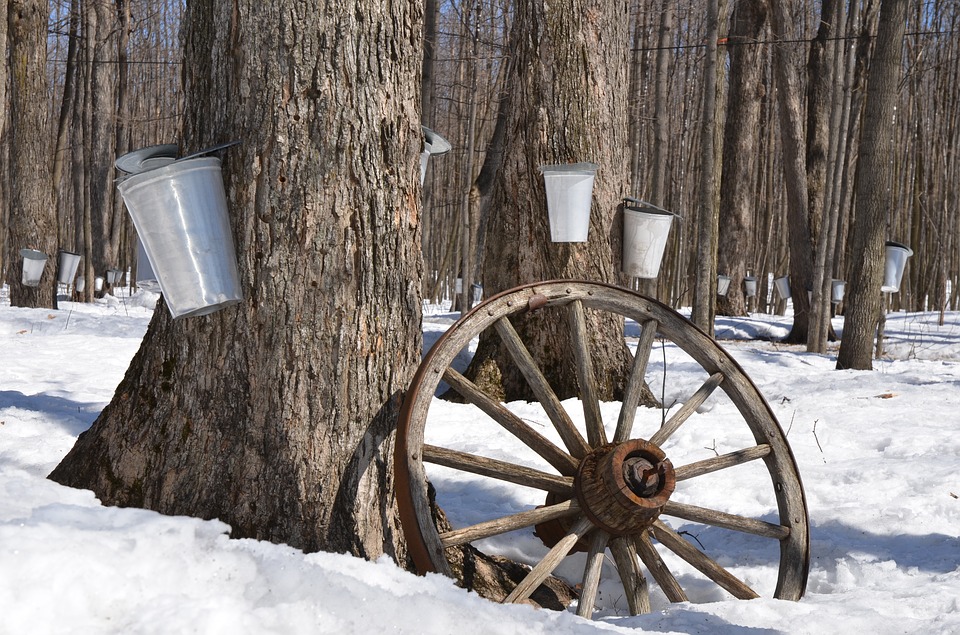Canada News
Quebec sugar shacks reeling after ‘catastrophic’ COVID 19 closures

While the pandemic has left few businesses untouched, the timing has been particularly cruel for Quebec’s several hundred commercial sugar shacks, many of whom earn the vast majority of their profits during the sugaring-off season that runs from late February to early April. (Pixabay photo)
MONTREAL — Pierre Faucher spent much of the month of February preparing to welcome the tens of thousands of clients who flock annually to his sugar shack west of Montreal, eager to learn about traditional sap gathering and eat calorie-laden food drenched in sweet maple syrup.
Today, the long tables in the 200-year-old dining hall are empty, food remains uneaten and the peak-season staff of 100 has been reduced to five after the Quebec government ordered the shutdown of restaurants and gathering places to limit the spread of COVID-19.
While the pandemic has left few businesses untouched, the timing has been particularly cruel for Quebec’s several hundred commercial sugar shacks, many of whom earn the vast majority of their profits during the sugaring-off season that runs from late February to early April.
“It’s a massive blow,” said Faucher, who has operated Sucrerie de la Montagne in Rigaud, Que., for more than 40 years. He estimates that 60 per cent of his annual business comes during sugaring-off season.
“I’ve had difficult situations, but this wins first prize.”
Faucher said the only operation that continues is making syrup, which his farm does by hand. There have been a few takeout food orders, but none of it is enough to make up for what is lost.
Kasandra Cherrier, who co-owns Sucrerie Bonaventure in Mirabel, north of Montreal, estimates her losses at $250,000. Unlike Faucher, her business isn’t authorized to operate year round, meaning she won’t be back in business until 2021.
She said the timing of the closure was particularly painful, since she’d just paid thousands of dollars to stock up on food and hire employees.
Now, she’s had to give most of her food to the needy and is looking to secure a loan to avoid closure and bankruptcy.
While she’s making a little money from her online boutique, she’s wondering what to do with the vast vats of marinade, pickles and beets she’d prepared for the 40,000 clients she won’t welcome.
“I’ve had to pay more just to undo that preparation,” she said.
While the province’s maple syrup production appears to be going fairly smoothly, the season has been a disaster for commercial sugar shacks that depend on dining room revenue, according to a spokeswoman for the organization representing maple syrup producers in Quebec.
“For those businesses, which make their numbers in March and April, it’s certainly going to be a catastrophic season, and how they’ll get through it is yet to be seen,” Helene Normandin said in an interview.
Normandin said that while they are just a fraction of the province’s 7,000 producers, these sugar shacks play an important role in keeping Quebec culture alive.
“Even if they’re just a few hundred, they’re most often the link between the consumer and production because in our imagination, that’s what a sugar shack is,” she said.
She said the association has formed a committee to help lobby for them, and has also been promoting their products on a website, Erable d’Ici.
The closure of their dining rooms has prompted some sugar shacks to try to move online, offering up takeout meals and even Facebook-streamed brunch sessions.
Michael Constantin said his family-run sugar shack north of Montreal has been offering a full frozen traditional meal for customers to pick up and eat at home.
He said he’s seen a boost in orders, even though he isn’t yet set up to offer delivery.
While it’s nothing compared to the revenue from the dining room, he’s hopeful it will be successful enough that he can hire back a few of the employees he laid off, with the help of a federal government wage subsidy program.
He’s also hoping that the virus will subside enough to allow his summer weddings and events to move forward.
Faucher is also confident that his family-run business will survive for another year, even though he’ll have to take on debt to do so.
In the meantime, he’s focusing on maintaining his property and looking forward to an eventual reopening.
“My parents and grandparents lived through the First and Second World Wars and the Spanish flu,” he said. “There’s no reason I can’t get through this.”





















